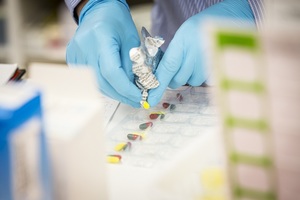Government invests in global partnership to treat gonorrhoea
The £3.5 million investment will help develop new treatments for gonorrhoea and make them available to low- and middle-income countries.

The investment is part of a continued partnership with the Global Antimicrobial Resistance Innovation Fund (GAMRIF) and the Global Antibiotic Research and Development Partnership (GARDP).
The investment will:
-
enable global access to treatment, including in low- and middle-income countries where the burden of antimicrobial resistance (AMR) is greatest
-
fund GARDP’s development of oral antibiotic zoliflodacin, which is now in the last stage of clinical trials before reaching the market
Zoliflodacin is one of the few antibiotics in development to specifically treat gonorrhoea and is significant as treatments for gonorrhoea are becoming less effective.
There have been cases of gonorrhoea developing resistance to recommended treatments, including in the UK.
Gonorrhoea is among the most common sexually-transmitted infections (STIs), with an estimated 87 million new cases globally every year.
The STI can have severe consequences on public health and, when left untreated, serious consequences for reproductive health as well as increased risk of transmission of HIV and other STIs.
Women, and marginalised and vulnerable groups are disproportionately affected.
Gonorrhoea has been identified as posing a significant threat to global health by the World Health Organization (WHO). There is now an urgent need for new treatment options, particularly for people in developing countries.
Addressing drug-resistant infections is critical to achieving the UN’s sustainable development goals, particularly the target for good health and wellbeing for all.
GARDP will now start pharmaceutical development activities for zoliflodacin, and will develop a new strategy for access and appropriate use in low- and middle-income countries that have a high number of cases of gonorrhoea.
GARDP plans to develop 5 new treatments for bacterial infections by 2025.
Minister for Innovation, Nicola Blackwood, said:
The UK is a global leader in tackling antimicrobial resistance, a threat that is posing serious risks to health and the global economy, as well as killing hundreds of thousands of people around the world each year.
It is vital to fund new antibiotic research and development to tackle AMR and this innovative project will develop solutions to treat the global rise of gonorrhoea and improve the quality of people’s lives.
Dr Manica Balasegaram, Executive Director of GARDP, said:
We are excited to unveil our new strategy, 5 BY 25, outlining GARDP’s ambition to accelerate the development of 5 new treatments by 2025.
The recent initiation of the phase 3 trial of zoliflodacin is an important milestone towards bringing one of our 5 treatments a step closer to patients by 2025.
The global nature of the trial, across 4 continents, represents our commitment to ensuring this treatment is available to anyone in need, wherever they live.
Updates to this page
-
The following information has been added to paragraph 1: the Global Antimicrobial Resistance Innovation Fund (GAMRIF) are also part of the continued partnership with the government.
-
First published.